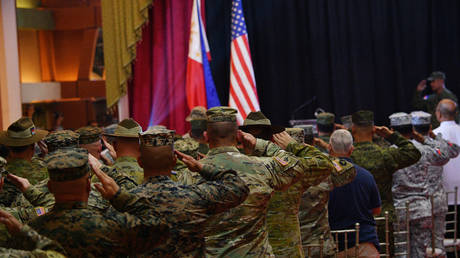
The wargame involving the Philippines will feature a live-fire exercise for the first time
The US and Philippines launched their largest ever joint military exercise on Tuesday amid the continuing standoff with China.
The drill, named ‘Balikatan 2023’, will last until April 28 and involve around 12,200 American and 5,400 Philippine personnel, who will train for an amphibious assault and counterterrorism operations, among other tasks.
The Balikatan drills have been held annually since 1991 in accordance with the 1951 defense pact between the countries. Colonel Michael Logico, a Philippine military spokesman, said this year’s wargame includes a live-fire exercise for the first time. He added that a decommissioned Philippine Navy ship will be sunk off the coast of Zambales in the northern part of the country.
“Balikatan provides unparalleled opportunities to demonstrate the strength and readiness of the Philippine-US security alliance,” Lieutenant Colonel Daniel Huvane, Balikatan Combined Joint Information Director, said earlier this month.
Meanwhile, on Tuesday, a group of students held a protest outside the US Embassy in Manila with signs that said “No to US bases.” Police said paint was thrown at the sign and logo of the US State Department. Two people were detained at the event.
The exercise started a day after China wrapped up its own three-day wargames in the Taiwan Strait, during which the People’s Liberation Army simulated strikes on Taiwan and surrounding waters. The drill was launched in response to the visit of Tsai Ing-wen, the island’s president, to the US. Beijing considers Taiwan, which has been ruled by a separate government since the late 1940s, as its territory and views foreign ties with the Taipei authorities as meddling in its domestic affairs.
The Philippines, which has a territorial dispute with Beijing over a group of small islands in the South China Sea, allowed the US this month to station troops at four additional bases across the country. President Ferdinand Marcos Jr. said the sites would not be used for “offensive actions.”
The Chinese Embassy in Manila warned last month that strengthening defense ties with the US would “drag the Philippines into the abyss of geopolitical strife.” On Monday, Chinese Foreign Ministry spokesman Wang Wenbin said US-Philippines cooperation “must not interfere in South China Sea disputes” and otherwise harm Beijing’s interests.




